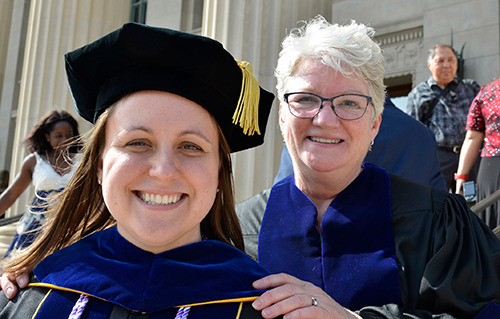Knowledge Seeker: PhD Student Mary Whipple
October 13, 2019
Mary Whipple came to the School of Nursing’s PhD program on a mission to improve the lives of older adults with chronic health conditions. She had seen firsthand the drastic effect a fall had on her grandmother, who had diabetes and was forced to live in a nursing home after the incident.
Once in the program, Whipple’s Quantitative Research Design and Methods course briefly caused her to recalibrate her ambitions: All of the research questions she had in mind had already been explored, it seemed.
“But really I wasn't getting deep enough into the literature,” she says. “The more I learn, the deeper I get in it, the more gaps I realize there are and the more work there is to be done.”
Whipple is taking up that work as a nurse researcher, with the broad goal of identifying strategies to help older adults live longer, healthier lives. After completing her PhD in July, she started a postdoctoral fellowship in the School of Medicine at the University of Colorado Denver – Anschutz Medical Campus, where she’s delving deeper into the physiology of aging and integrating more tools into her research repertoire. “I feel like, as a nurse with a PhD, I can have a really unique impact on patient care and on the health of individuals,” she says.
“I feel like, as a nurse with a PhD, I can have a really unique impact on patient care and on the health of individuals,”
Right into research
Whipple discovered her love of research when she spent a summer on the University of Minnesota Twin Cities campus as an undergraduate biology and psychology student at Luther College. Still, as she neared the end of her Bachelor of Science in Nursing program through the School of Nursing in Rochester, she figured she would spend a few years working in the field.
Instead, her honors program faculty adviser nudged her to follow her enthusiasm for research and pursue her PhD right away.
“I haven't looked back since,” says Whipple, who received a scholarship from the National Hartford Center for Gerontological Nursing Excellence to support her PhD studies.
For her dissertation, Whipple examined older adults with peripheral artery disease (PAD)—blockages in the arteries of the legs—and the impact of exercise on their condition. She visited five sites around the Twin Cities metro, conducting walking tests and balance exercises with study participants and gathering data from activity monitors.
By better understanding why some patients don’t see benefits, she hopes to modify and improve exercise programs to more consistently bolster quality of life. “It's been wonderful being the principal investigator, having the opportunity to see that project through from start to finish and to work directly with patients,”
“It's been wonderful being the principal investigator, having the opportunity to see that project through from start to finish and to work directly with patients,”

Monumental mentors
To develop her study, Whipple consulted with two experts in PAD and exercise interventions who also happened to be her faculty co-advisers: Professor Diane Treat-Jacobson and Assistant Professor Erica Schorr.
She also connected with a range of faculty members throughout her five years in the program by working on large grant projects, randomized controlled trials and collecting data at the Minnesota State Fair.
“I've had the opportunity to interact with experts in the field who are more than just advisers, but really mentors,” she says. “They're very invested in me, in my success, also in my personal life. I know these are professional relationships and friendships that are going to last a long time.”
That mentorship, and the chance to pass along similar guidance and support, is a large reason why Whipple hopes to land a faculty role after completing her postdoctoral fellowship.
She says nurses with PhDs can benefit a range of organizations—not just academia—and she wants to help prepare future nursing researchers.
“Nurses have a unique lens through which they look at the world,” she says. “We look at the whole person. We're interested not only in a disease or a condition, but also how that impacts the individual, how that impacts their daily life, their social situation. That unique lens is what nurses bring to research and what I think can really make a difference.”